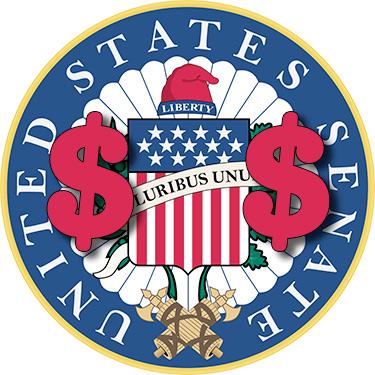By Jim Ellis
July 20, 2021 — The second quarter Federal Election Commission financial disclosure reports are now public, and while it will take some time to comprehend the individual filings, we can look at the aggregate state data to begin drawing some early US House political situation conclusions:The following is a list of the 80 office holders and candidates who exceeded $1 million-plus in receipts since Jan. 1, 2021, including 74 incumbents.
A total of 45 are Democrats as compared to 35 Republicans. A brief explanation of why certain individuals have raised this much money is also included.
California
| INCUMBENT | PARTY | DIST | RECEIPTS | CASH-ON-HAND |
|---|---|---|---|---|
| Pelosi, Nancy | D | CA-12 | $6,873,128 | $7,150,847 |
| McCarthy, Kevin | R | CA-23 | $6,312,663 | $6,305,397 |
| Porter, Katie | D | CA-45 | $4,887,831 | $12,859,730 |
| Schiff, Adam | D | CA-28 | $3,979,554 | $15,639,499 |
| Nunes, Devin | R | CA-22 | $2,525,366 | $11,539,624 |
| Khanna, Ro | D | CA-17 | $2,307,112 | $3,822,319 |
| Harder, Josh | D | CA-10 | $1,987,919 | $5,040,053 |
| Kim, Young | R | CA-39 | $1,594,073 | $1,447,568 |
| Garcia, Mike | R | CA-25 | $1,353,194 | $822,554 |
| Steel, Michelle | R | CA-48 | $1,352,557 | $1,008,266 |
| Collins, Joe | R | CA-43 | $1,199,044 | $180,383 |
| Swalwell, Eric | D | CA-15 | $1,085,947 | $654,799 |
No surprise that the two party leaders, Speaker Nancy Pelosi (D-San Francisco) and Minority Leader Kevin McCarthy (R-Bakersfield) top the fundraising list, though House Minority Whip Steve Scalise (R-LA) exceeded by just over $600,000 the top GOP total.
Reps. Katie Porter (D-Irvine) and Devin Nunes (R-Tulare) had their typically strong fundraising periods. Rep. Adam Schiff (D-Burbank) has the lowest population number of any district, and he sits in the middle of the San Fernando Valley. Both points make him vulnerable in redistricting from a state that is losing a congressional district. Joe Collins (R) is opposing Rep. Maxine Waters (D-Los Angeles). It is obvious from his large receipt total and small cash-on-hand figure that he is raising his money through direct mail prospecting, which is an expensive proposition.
Colorado
| INCUMBENT | PARTY | DIST | RECEIPTS | CASH-ON-HAND |
|---|---|---|---|---|
| Boebert, Lauren | R | CO-3 | $1,794,955 | $1,252,630 |
| Donovan, Kerry | D | CO-3 | $1,179,347 | $479,246 |
Obviously, the western slope 3rd District race will be competitive and expensive.
Florida
| INCUMBENT | PARTY | DIST | RECEIPTS | CASH-ON-HAND |
|---|---|---|---|---|
| Gaetz, Matt | R | FL-1 | $3,277,058 | $1,585,935 |
| Cherfilus-McCormick, Sheila | D | FL-20 | $2,409,407 | $2,081,704 |
| Mast, Brian | R | FL-18 | $1,749,636 | $1,720,117 |
| Donalds, Byron | R | FL-19 | $1,468,065 | $958,339 |
| Salazar, Maria Elvira | R | FL-27 | $1,201,681 | $672,473 |
| Murphy, Stephanie | D | FL-7 | $1,165,011 | $1,973,288 |
Sheila Cherfilus-McCormick (D) is in the special election to replace the late Rep. Alcee Hastings (D-FL). Most of her money is self-contributed. Rep. Matt Gaetz (R-Ft. Walton Beach) may soon be facing legal charges, so much of his campaign treasury may be paying legal fees. Reps. Maria Elvira Salazar (R-Miami) and Stephanie Murphy (D-Winter Park) look to be facing serious re-election opposition.
Georgia
| INCUMBENT | PARTY | DIST | RECEIPTS | CASH-ON-HAND |
|---|---|---|---|---|
| Greene, Marjorie T. | R | GA-14 | $4,775,059 | $2,792,569 |
| Flowers, Marcus | D | GA-14 | $2,018,385 | $547,579 |
| McBath, Lucy | D | GA-6 | $1,575,051 | $1,326,020 |
| Bourdeaux, Carolyn | D | GA-7 | $1,240,567 | $1,131,140 |
There is no doubt that the 14th District race featuring controversial Rep. Marjorie Taylor Greene (R-Rome) will be expensive and attract a great deal of media attention. Reps. Lucy McBath (D-Marietta) and Carolyn Bourdeaux (D-Suwanee) face uncertain redistricting challenges.
Illinois
| INCUMBENT | PARTY | DIST | RECEIPTS | CASH-ON-HAND |
|---|---|---|---|---|
| Krishnamoorthi, R. | D | IL-8 | $2,282,380 | $10,090,383 |
| Kinzinger, Adam | R | IL-16 | $1,954,927 | $3,075,610 |
| Underwood, Lauren | D | IL-14 | $1,685,298 | $1,479,294 |
Rep. Raja Krishnamoorthi (D-Schaumberg) is a consistent major fundraiser. Rep. Adam Kinzinger (R-Channahon) faces an uncertain redistricting situation along with a strong Republican primary challenge. Rep. Lauren Underwood (D-Naperville) will likely receive a more Democratic seat in redistricting.
Iowa
| INCUMBENT | PARTY | DIST | RECEIPTS | CASH-ON-HAND |
|---|---|---|---|---|
| Hinson, Ashley | R | IA-1 | $1,443,371 | $929,482 |
| Axne, Cindy | D | IA-3 | $1,292,496 | $1,038,635 |
| Miller-Meeks, M. | R | IA-2 | $1,045,361 | $1,174,066 |
As we can see from the fundraising totals, Iowa could be the most competitive US House state in 2022 with three of the state’s four seats being top-tier challenger races.
Kansas
| INCUMBENT | PARTY | DIST | RECEIPTS | CASH-ON-HAND |
|---|---|---|---|---|
| Davids, Sharice | D | KS-3 | $1,192,865 | $1,222,016 |






 In Alabama, former US attorney general and ex-three term senator Jeff Sessions, and retired Auburn University head football coach Tommy Tuberville move to a postponed July 14 runoff that was originally scheduled for March 31. Tuberville placed first in the primary election by one percentage point over former Sen. Sessions, attempting to make a political comeback and overcome his national feud with President Trump. The longer runoff cycle may give Sessions the opportunity for a rebound.
In Alabama, former US attorney general and ex-three term senator Jeff Sessions, and retired Auburn University head football coach Tommy Tuberville move to a postponed July 14 runoff that was originally scheduled for March 31. Tuberville placed first in the primary election by one percentage point over former Sen. Sessions, attempting to make a political comeback and overcome his national feud with President Trump. The longer runoff cycle may give Sessions the opportunity for a rebound.